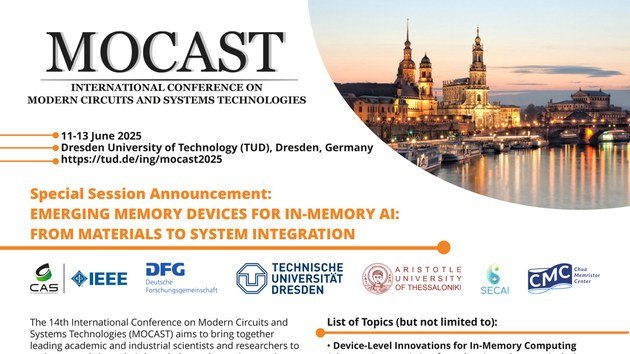Upcoming Presentation at MOCAST 2025
Chong Peng, a PhD student from NaMLab, will be presenting at the 14th International Conference on Modern Circuits and Systems Technologies (MOCAST 2025) in Dresden, Germany.
The MOCAST 2025 conference, hosted by Technische Universität Dresden (TUD), focuses on emerging technologies in electronics, circuits, systems, and communications.
Chong’s presentation, titled "Nucleation-limited-switching based compact models for Hf-based ferroelectric devices and their applications in memory arrays," explores innovative compact models for Hf-based ferroelectric devices—specifically addressing their potential applications in memory arrays. The goal of his research is to improve the understanding of ferroelectric materials and their application in the development of next-generation memory systems.
This research is part of the Ferro4EdgeAI project, which is exploring AI-driven memory solutions. By advancing Hf-based ferroelectric devices, Chong's work is contributing to the project’s broader efforts to enhance the performance and scalability of memory devices for AI applications.
MOCAST 2025 is an internationally recognised event that brings together top-tier academic researchers, industry professionals, and innovators from across the world. This year, the conference will feature special sessions focused on critical topics such as:
Advances in Memristive Neuromorphic Devices & Circuits for Artificial Intelligence and Edge Computing
Emerging Memory Devices for In-Memory AI: From Materials to System Integration
As MOCAST 2025 focuses on emerging memory technologies, including memristive devices and AI-driven memory systems, Chong's presentation will be a significant contribution to this critical conversation. His research, aimed at improving ferroelectric memory technologies, will showcase how AI can drive the future of memory systems and in-memory AI solutions.
We look forward to Chong Peng's presentation at MOCAST 2025 and the valuable insights it will bring to the field of ferroelectric memory.

